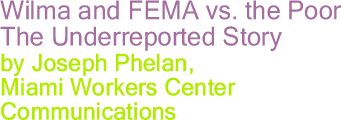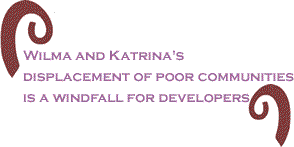
|
|||||||||||||||||||||
 |
|
This article appeared in Portside.org. As days turn into weeks the situation worsens for the poor people left behind not only by aid relief but also by society as a whole. People who had been living under slumlord conditions are evicted from housing that has been deemed unsafe for human habitation, yet at the same time there is no alternative housing offered. People living paycheck to paycheck are facing the stress of lost jobs due to homelessness or business closures. They are also facing a hostile city government, which refuses to spend reimbursable money on temporary vouchers for hotels. The situation in Miami is very similar to New Orleans in the wake of Hurricane Katrina, if not in scale than in intention. A system of aid and relief failed poor people of color. This failure is not a sudden breakdown of an otherwise functioning society. It is a sharp illustration of the structural problem of underdevelopment in particular communities, namely poor, urban, and black and immigrant. Evictions and death due to lack of health care, hunger, and poor living conditions are a reality for these populations. These permanent conditions under the neo-liberal policies of today's capitalism are only accelerated by the crisis of natural disasters. The tragedy of New Orleans was highlighted by immense press coverage, as it should have been, do to the severely dramatic nature of bursting levees and massive flooding. Press coverage and public outcry at the lack of support for low income communities of color leading up to, during, and after Katrina forced President Bush to acknowledge "that poverty has roots in a history of racial discrimination, which cut off generations from the opportunity of America," a line that cuts sharply against the right wing push to dismantle hard won civil rights.
While poor people of color were displaced in relatively large numbers in both Miami and New Orleans the cities' tourist destinations were up and running with electricity first. In Miami, the beach and other wealthy and tourist areas were sealed off and protected by police and National Guard under curfews and martial law. This indignity only served to further highlight the sad reality of the U.S. society as illustrated by Gihan Pereara of the Miami Workers Center: "We are living in two cities, two worlds, one poor and working class, the other rich." Victims of Katrina in New Orleans and victims of Wilma in Miami lived through a storm of immense natural power and destruction. But more destructive than the winds and water is the disaster of economic injustice and racism This killer does not find its origins in the Atlantic but in the board rooms of corporate developers, the meetings rooms of real estate speculators and the back rooms of banks. Katrina has now rendered all of New Orleans a clean slate for mega-casinos and luxury hotels. Miami's poor black and immigrant communities were already facing an ironic affordable housing crisis in the middle of an unprecedented building boom with the promise of 70,000 luxury condo units to be built in the next four years. The forced removal of these communities was on the horizon before Wilma, the destructive nature of the hurricane just happened to be more immediately violent. Wilma and Katrina's displacement of poor communities is a windfall for developers.
In the wake of Katrina a lot of the talk from political leaders focused on re-building. Because of strong national attention on the area there is a possibility that this rebuilding process will not completely exclude the communities that originally lived there. But with no state-sponsored support prior to and immediately following the storm, a terrible to non-existent tracking program for displaced people, and a legacy of disenfranchisement for poor people of color, the question has to be raised: Who will direct and benefit from the rebuilding of New Orleans and Miami and who will be left out of the picture? The answer to that question is all too clear under the present political regime. It is the poor, the black, the immigrant, the low wage earner, the mother, the children of them all that pay the price. It is on their backs that a few may prosper handsomely, and it is those few that make decisions for all of us. Joseph Phelan is a Communications Assistant at the Miami Workers Center. |
|
| Home | |
Your comments are always welcome. Visit the Contact Us page to send e-Mail or Feedback or Click here to send e-Mail to [email protected] e-Mail re-print notice
If you send us an e-Mail message we may publish all or part of it, unless you tell us it is not for publication. You may also request that we withhold your name. Thank you very much for your readership. |
|
| November 17 2005 Issue 159 |
|||||||||
|
|||||||||
|
|
|||||||||
| Printer Friendly Version in Plain Text or PDF format. Download free Adobe Reader. | |||||||||
 |
|||||||||
 |
|||||||||
| |
|||||||||
| |
|||||||||


























